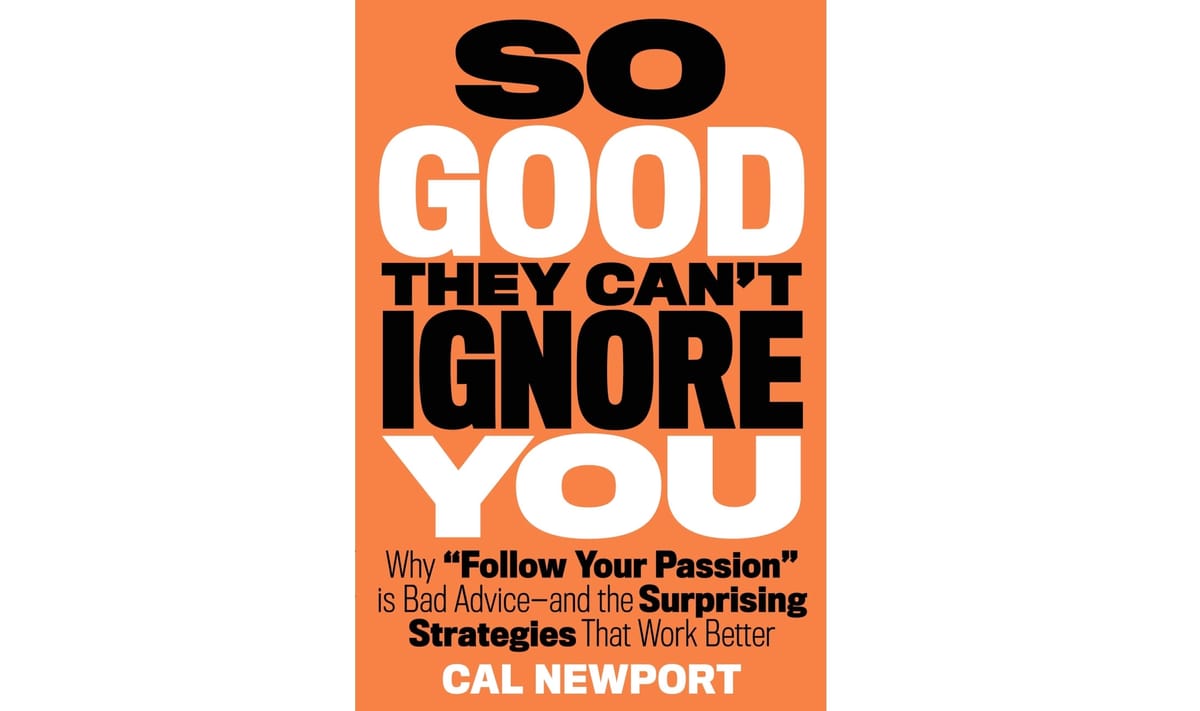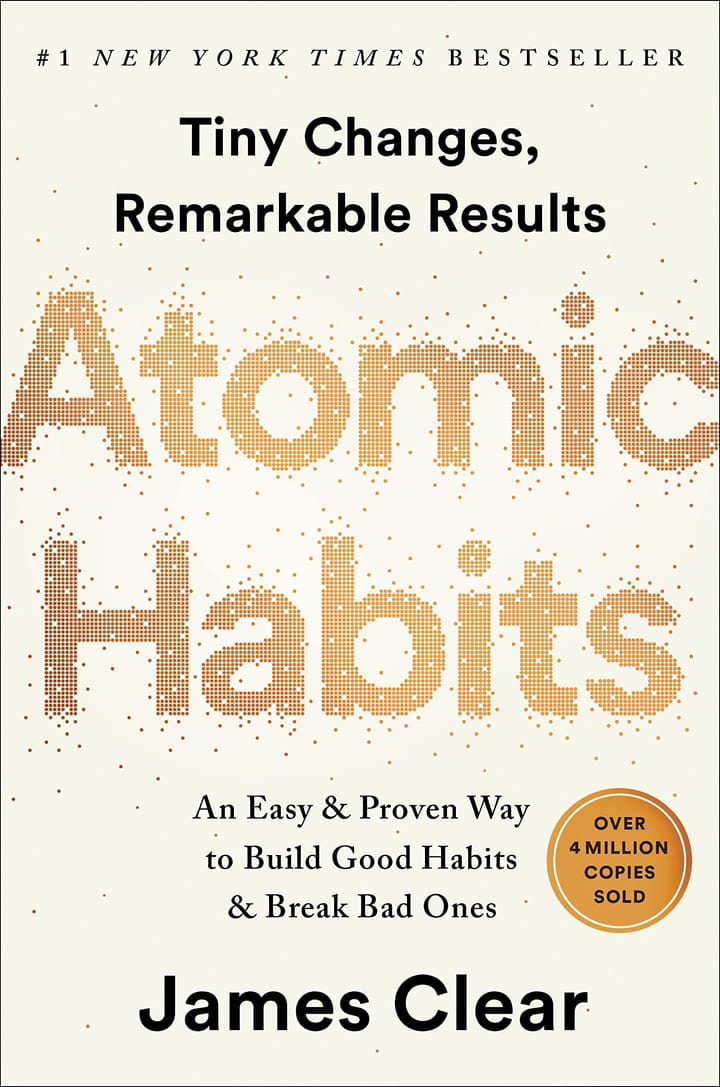So Good They Can't Ignore You

You can purchase the book here: Hardcover | Kindle
Rule #1: Don’t Follow Your Passion
Newport explains why he believes subscribing to the passion hypothesis is counterproductive:
- Career passions are rare.
- Passion takes time to develop.
- Passion is a side effect of mastery.
- The passion hypothesis is dangerous in that it causes angst in those who continue to search for a job that aligns with what they believe they're passionate about.
Rule #2: Be So Good They Can’t Ignore You
The passion mindset leads you to believe that somewhere out there is a perfect job just right for you. This is highly unrealistic for most people. This belief often leads to chronic unhappiness and confusion when the reality of the working world fails to match this dream.
Born Standing Up by Steve Martin:
Be so good they can’t ignore you.
The passion mindset asks you to leave behind self-centered concerns about whether your job is “just right,” and instead put your head down and plug away at getting really damn good. No one owes you a great career. You need to earn it, and the process won’t be easy.
Jordan Tice, a professional guitarist, is passionate about playing the guitar. He is very good because he has spent countless hours of deliberate practice sharpening his skills for the sole purpose of becoming a better guitarist.
Regardless of how you feel about your job right now, adopting the craftsman mindset will be the foundation on which you’ll build a compelling career. Through dedication to the craftsman mindset, one begins to attain career capital.
The Career Capital Theory of Great Work:
The traits that define great work are rare and valuable.
Supply and demand says that if you want these traits you need rare and valuable skills to offer in return. Think of these rare and valuable skills you can offer as your career capital.
The craftsman mindset, with its relentless focus on becoming “so good they can’t ignore you,” is a strategy well suited for acquiring career capital. This is why it trumps the passion mindset if your goal is to create work you love.
Times when the craftsman mindset fails:
- The job presents few opportunities to distinguish yourself by developing relevant skills that are rare and valuable.
- The job focuses on something you think is not useful or perhaps even actively bad for the world.
- The job forces you to work with people you really dislike.
Deliberate practice should be designed for the sole purpose of effectively improving specific aspects of an individual’s performance.
- The difficulty should be just outside of your comfort zone; otherwise, you will plateau.
- You need to be constantly soliciting feedback from colleagues and professionals in order to discover new unbiased ways to improve.
The 5 Habits of a Craftsman:
1. Decide what capital market you’re in: Winner-take-all vs. auction
- Winner-take-all market: there is only one type of career capital available, and lots of different people are competing for it (e.g. TV writing and your ability to write good scripts).
- Auction market: there are many different types of career capital, and each person might generate a unique collection (e.g. Medicine and the different types of healthcare workers).
2. Identify your capital type
- In winner-take-all markets, there is only one type of career capital, so this is trivial.
- In an auction market, there is flexibility. Seek open gates — opportunities to build capital that are already open to you. Securing open gates helps you attain career capital faster.
3. Define what “good” is
- Once you decide what you want to do, you need to figure out how to become good through deliberate practice. Create clear goals to achieve success.
4. Stretch and destroy (or, Antifragility)
- Deliberate practice is often the opposite of enjoyable. If you’re not uncomfortable, then you’re probably stuck at only an acceptable level.
- Imagine stretching your muscles when weight-lifting. They are destroyed and then they grow back bigger and stronger.
- Embrace honest feedback — even if it destroys what you thought was good. Your opinion isn’t what counts.
5. Be patient
- Acquiring capital takes time.
(See my notes on Atomic Habits and The Art of Learning for more on the topic of building sustainable habits and how to learn a new skill effectively.)
Rule #3: Turn Down A Promotion
The dream-job elixir is control
The First Control Trap: It is dangerous to pursue more control in your working life before you have career capital to offer in exchange. Control is seductive, but when acquired without career capital, it is unsustainable.
The Second Control Trap: Once you attain the career capital to acquire more control in your working life, you have become valuable enough to your employer that they will fight your efforts to gain more autonomy.
Know when the time is right to be courageous in your career decisions. The fault in “courage culture” is not the underlying message that courage is good, but its severe underestimation of the complexity involved in deploying this boldness in a useful way.
The Law of Financial Viability: You should only pursue a bid for more control if you have evidence that it’s something that people are willing to pay for. If you find this evidence, then continue; if not, move on.
Rule #4: Think Small, Act Big
Choosing a career mission is similar to a scientific breakthrough — it’s an innovation waiting to be discovered in the adjacent possible of your field.
Having a mission chosen before you have relevant career capital, however, is not likely to be sustainable. You can’t skip straight into a great mission without first building mastery in your field.
Therefore, in order to get to the cutting edge of your field and determine your mission, you must first have expertise.
Great missions are transformed into great successes as the result of using small and achievable projects — little bets — to explore the concrete possibilities surrounding a compelling idea.
An excerpt from Little Bets by Peter Sims:
Rather than believing they have to start with a big idea or plan out a whole project in advance, they make a methodical series of little bets about what might be a good direction, learning critical information from lots of little failures and from small but significant wins. [The rapid and frequent feedback] allows them to find unexpected avenues and arrive at extraordinary outcomes.
Great missions are transformed into great successes as the result of finding projects that satisfy the law of remarkability, which requires that (1) an idea inspires people to remark about it, and (2) is launched in a venue where such remarking is made easy.
Purple Cow by Seth Godin:
You’re either remarkable or invisible.
In sum, mission is one of the most important traits you can acquire with your career capital. But adding this trait to your working life is not simple. Once you have the capital to identify a good mission, you must still work to make it succeed. By using little bets and the law of remarkability, you greatly increase your chances of finding ways to transform your mission from a compelling idea into a compelling career.




Comments ()